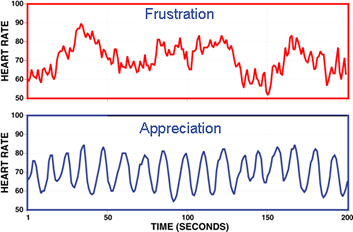 Did you know you have an internal predictor of your personal risk of developing future health problems, such as diabetes, cancer, cardiovascular disease, Alzheimer’s disease, and metabolic syndrome? All you have to do it look toward your heart. Specifically, your heart rate variance.
Did you know you have an internal predictor of your personal risk of developing future health problems, such as diabetes, cancer, cardiovascular disease, Alzheimer’s disease, and metabolic syndrome? All you have to do it look toward your heart. Specifically, your heart rate variance.
Your own personal heart rate variability (HRV) provides you a visual picture of how your body is physically responding to the world around you. In fact, by taking a closer look at changes in heart rate, we can glean important facts and clues. For example, we can learn how well you are able to self-regulate your stress overall and your emotional responses to situational stressors.
Variations in heart rhythms are a normal and natural occurrence. With age, our natural ability to have a larger variation declines and yet having a wider range of variability is associated with health. For example, a lower range of variability is associated with chronic disease and inflammation. A higher range of variability may be attributed to a natural ability to cope with stress.
Of note, having a large or small range of heart rate variability is not to be confused with having a high or low heart rate. These are two different measures and tests. With HRV, the variability is the key—we’re looking for the difference between the highs and lows of your resting heart rate.
Your emotional state plays a huge role in your heart rate variability pattern. When you are in a state of chronic stress and your HRV pattern is erratic, your nervous system becomes depleted, which will begin to alter you body’s ability to respond, cope, and compensate when exposed to future stressors.
The vagal nerve is the nerve that controls the heart, lungs, and digestive tract. When we are in high states of stress, all three systems will have an immediate response. Prolonged stress will impair overall function of these body systems, ultimately resulting in chronic disease. When we are in a state of stress, whether it is due to pain, worry, toxic exposure, etc., our entire body chemically responds with neurotransmitters, hormones, and immune system modulators. Every system is activated. With prolonged stress, we become depleted both physically and emotionally.
When you are in a state of frustration, your HRV pattern can be jagged and erratic. When you are in a state of appreciation, your HRV pattern will be smooth and coherent. That smooth, coherent pattern of HRV has been shown to improve mental acuity, ability to focus and problem solve, and enhance physical activity and coordination. Techniques to improve HRV have commonly been used to help people to find relief from pain, depression and anxiety, to improve test scores, and to improve performance in athletes.
You can help regulate and improve your HRV by practicing various, daily techniques to help neutralize your negative feelings and to build uplifting, calming emotions. In fact, positive emotion-based focus on the area of the heart, along with a deep and slow breathing pattern, can intentionally generate a change in the heartbeat pattern.
Why put positive focus on the heart? The ability of the heart to respond to emotional stressors is quick and noticeable. Do you ever find yourself upset or anxious, even feeling like your heart is pounding out of your chest? What is happening is that your body is responding, signaling to you to either run or fight. And to help you succeed, the heart is pumping blood faster through the body to provide the muscles with oxygen and therefore energy. But the heart will often respond before your mind can even comprehend the stressor in front of you. In fact, our heart has more nerves heading to the brain than the brain has nerves headed to the heart. This means the heart has more avenues to send messages to critical areas of the brain to fine-tune your systemic stress response.
For a change, focusing first on the heart—and not the worries and fears in our head—can have a dramatic impact on our stress levels. It helps to create communication with the brain. And when you empower that communication, you’re better able to shift to a new and healthy emotional baseline.
References:
Heart Math Institute. Heart math Interventions Program for health professionals.
